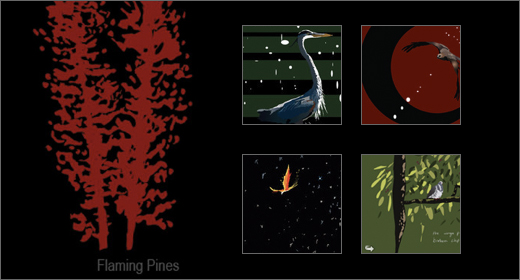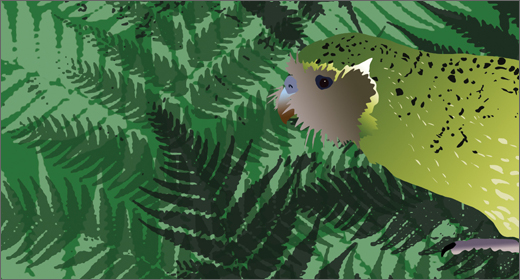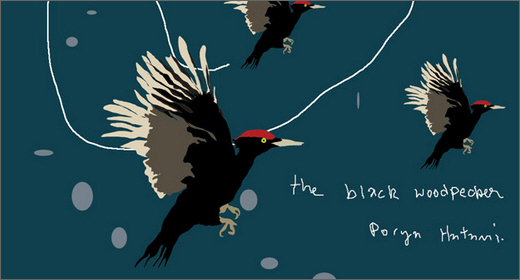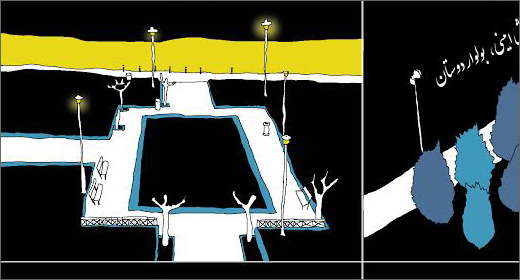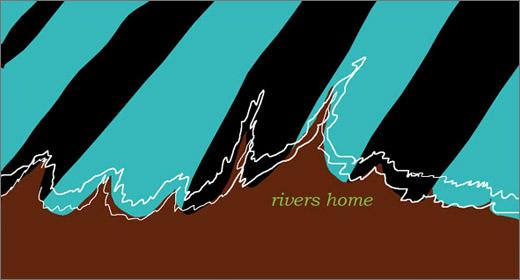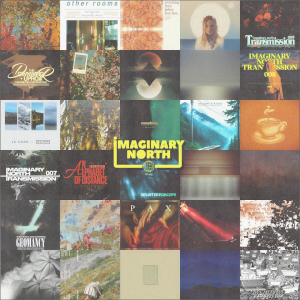The second quartet of Flaming Pines‘ year-long Birds of a Feather 3″ CDR series is now available, bringing us at least halfway through its planned “at least twelve” volumes. All four are epic journeys, even when covering relatively little ground.
:: :: :: ::
[The Green Kingdom :: The Great Blue Heron] The Green Kingdom has allowed his choice to be dictated by state environmental legislation. The Great Blue Heron, though rare, is protected by a rookery encompassing the region of southeast Michigan in which the artist resides. Declaring that watching the great wingspan of the bird overhead “almost takes you back to prehistoric times,” he has composed a suitably impressive suite. While a steady, melodic harmonium drone soars through both clear and hissing skies, a very up-close, acoustic guitar stops and starts, assuming the point of view of the tiny human on the ground, head tilted back skyward, turning round and round and stumbling a bit, trying to follow its flight.
:: :: :: ::
[Darren McClure :: The Black Kite] Darren McClure lives in Nagano and has used this opportunity to combine field recordings culled from many walks along the nearby Naraigawa River with the distinctive call of these birds, recorded separately. As its swells, the music builds a Shinto temple in honor of the experience his mind associates with the birds and the environment they inhabit, flitting from mountain to river in search of food. As it peaks, the atmosphere is that of an outdoor cathedral, mighty organ tones ringing up toward the kites, echoing through the forest canopy. It has a slow, sacral dignity.
:: :: :: ::
[Simon Whetham :: The Phoenix] Simon Whetham is the first contributor to take the liberty of selecting a mythical creature, the Phoenix, based on field recordings he made on Phoenix Island in Cambodia. Whetham perceives its story as a fitting metaphor for his work, resurrecting the sound of times past by integrating it into a new context. We move like pilgrims from inside to outside and back inside again, through insect susurration thick as curtains and wildlife calls and a poignant, twice-recurring violin, past lapping water on a ramshacke cart and on toward the big and small bells of a very real temple and the folks within. As one approaches closely, the recording abruptly stops. Whetham furthermore sees his piece as an allusion to the struggle of Cambodia and neighboring Vietnam to shake off recent, horrific pasts and flourish once again.
:: :: :: ::
[Broken Chip :: The Wonga Pigeon] In contrast to the many levels on which Whetham invites listeners to enjoy his phoemix, Australia’s Broken Chip has chosen to convey simple communion with a domestic pigeon he encountered in his backyard. The affinity he feels with the bird is wrapped in the most flowingly ambient of the compositions reviewed here, very much in the spirit of Brian Eno and Harold Budd’s famous duets. The briefest of all four as well, its fleeting presence leaves the same kind of profound impression I presume the bird made on Broken Chip.
:: :: :: ::
For more information about Flaming Pines, visit flamingpines.com.






